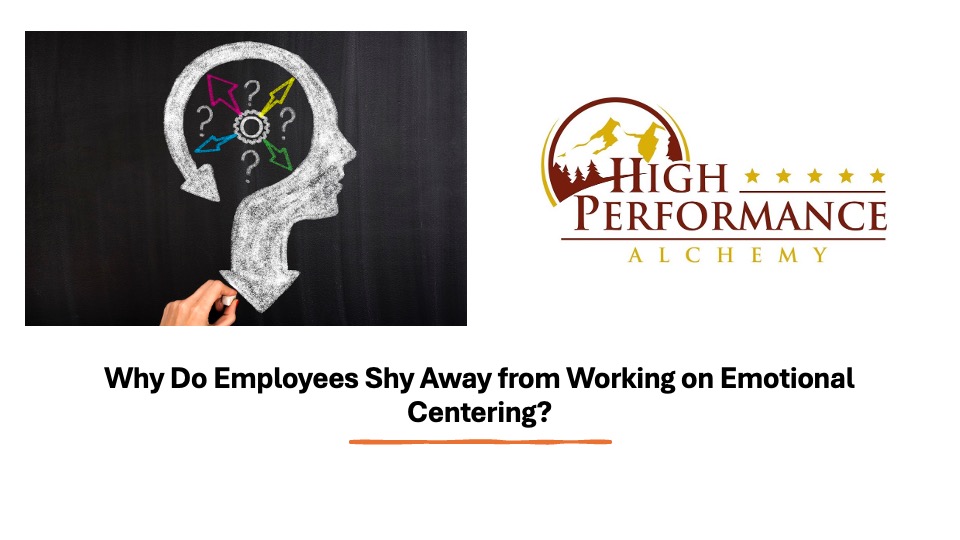Emotional centering, the practice of maintaining emotional balance and resilience, is crucial in today’s fast-paced work environment. Despite its importance, many employees shy away from working on their emotional centering.
This reluctance can be attributed to several factors, including
- misconceptions about emotional health,
- cultural and organizational influences and
- personal fears and insecurities.
Misconceptions About Emotional Health
One of the primary reasons employees avoid focusing on emotional centering is the widespread misconception that addressing emotions is a sign of weakness. In many cultures, there is a stigma associated with openly discussing feelings or seeking help for emotional issues. This stigma can make employees reluctant to engage in activities that promote emotional well-being, fearing they will be perceived as vulnerable or incapable.
Moreover, some employees believe that emotions have no place in the professional sphere. They may think that personal feelings should be kept separate from work to maintain professionalism. This belief can lead to the suppression of emotions, resulting in stress, burnout and decreased productivity. Employees who hold this view may not see the value in emotional centering practices, considering them irrelevant to their professional lives.
Cultural and Organizational Influences
The culture within an organization plays a significant role in shaping employees’ attitudes toward emotional centering. In workplaces where emotional intelligence and well-being are not prioritized, employees are less likely to engage in practices that support emotional health. If leadership does not model or encourage emotional centering, employees may feel that it is not a valued or acceptable practice within the organization.
Furthermore, high-pressure environments that prioritize results over well-being can discourage employees from taking time for emotional self-care. When the focus is solely on productivity and performance, employees may feel that they do not have the time or permission to invest in their emotional health. This can create a cycle of stress and burnout, making it even more challenging for employees to address their emotional needs.
Personal Fears and Insecurities
Personal fears and insecurities also play a significant role in why employees shy away from emotional centering. Many individuals fear that exploring their emotions will uncover feelings or issues they are not prepared to handle. This fear of the unknown can be a powerful deterrent, leading employees to avoid practices that encourage emotional exploration.
Additionally, some employees may lack confidence in their ability to manage their emotions effectively. They may worry that attempting to address their emotional health will make them feel overwhelmed or out of control. This lack of confidence can be compounded by a lack of knowledge or resources on how to begin working on emotional centering.
Overcoming The Barriers
To encourage employees to embrace emotional centering, it is essential to address these barriers directly.
Here are some strategies that can help:
Education and Awareness: Providing education about the importance of emotional health and the benefits of emotional centering can help dispel misconceptions. Workshops, seminars and training sessions can equip employees with the knowledge and tools they need to begin working on their emotional well-being.
Leadership Support: Leaders play a crucial role in setting the tone for an organization’s culture. When leaders prioritize their emotional health and model emotional centering practices, it sends a powerful message to employees that these practices are valued and important. Encouraging open discussions about emotions and well-being can help normalize these topics within the workplace.
Creating a Supportive Environment: Establishing a workplace culture that values and supports emotional well-being is essential. This can include providing access to resources such as counseling services, mindfulness programs and stress management workshops. Creating spaces where employees can take breaks and practice self-care can also be beneficial.
Encouraging Self-Reflection: Helping employees develop self-awareness and self-reflection skills can empower them to address their emotional health. Providing tools and resources for self-assessment and reflection can encourage employees to explore their emotions in a safe and structured way.
Promoting Work-Life Balance: Encouraging employees to maintain a healthy work-life balance can reduce stress and create more opportunities for emotional centering. Flexible work arrangements, reasonable workloads and promoting time off can help employees feel more balanced and less overwhelmed.
In conclusion, employees may shy away from working on emotional centering due to misconceptions, cultural and organizational influences and personal fears and insecurities. By addressing these barriers and creating a supportive environment, organizations can encourage employees to prioritize their emotional well-being, leading to a healthier, more productive workforce.
Are you ready to enhance your emotional well-being and create a more balanced, productive work environment? Connect with us for a strategy call to discuss personalized solutions tailored to your organization’s needs. Our team of experts is dedicated to helping you and your employees develop emotional centering practices that promote resilience, reduce stress and boost overall performance.
During the strategy call, we will explore your current challenges and goals and outline a customized plan to integrate emotional health initiatives into your workplace.
Let’s take the first step together towards a balanced and fulfilling life. We look forward to connecting with you!
Additionally, if your team requires support, visit our website for comprehensive solutions designed to enhance performance and drive success. We are dedicated to helping individuals and teams achieve their goals through expert advice and strategic planning.
www.highperformancealchemy.com
Don’t hesitate to connect with us and take the first step towards a brighter future.

